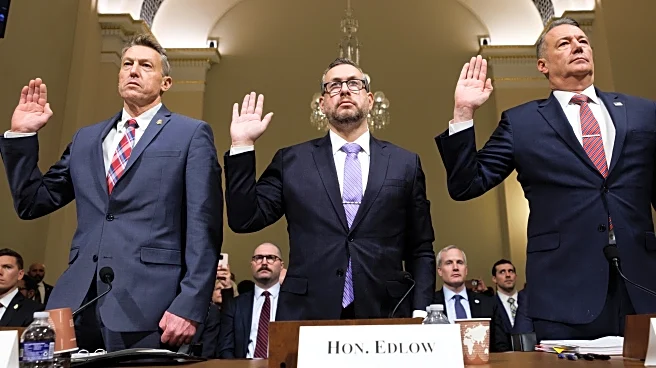What's Happening?
The historic Kiruna Church in Sweden has been relocated as part of the town's move due to the expansion of the world's largest underground iron-ore mine. The church, originally built in 1912, is known for its inclusive approach, incorporating minority languages such as Northern Sami, Finnish, and Meänkieli into its services. This move is part of a broader effort to preserve the cultural heritage of the region, particularly for the Indigenous Sami people. The relocation was attended by Sweden's King Carl XVI Gustaf, highlighting the significance of the event. The church's architecture and its single cross design reflect its commitment to inclusivity, a tradition that dates back to its founding.
Why It's Important?
The relocation of Kiruna Church underscores the ongoing efforts to preserve cultural heritage in the face of industrial expansion. For the Sami people, who have historically faced cultural suppression, the church's commitment to inclusivity represents a significant acknowledgment of their cultural and spiritual identity. This move also highlights the broader challenges faced by communities worldwide as they balance economic development with cultural preservation. The church's relocation serves as a symbol of reconciliation and respect for minority cultures, which is crucial in fostering social cohesion and cultural diversity.
What's Next?
The church is expected to reopen to worshippers by the end of next year, continuing its role as a cultural and spiritual hub for the community. The Swedish government's truth commission is set to address the historical trauma experienced by the Sami people, with findings expected by December 1. This could lead to further initiatives aimed at cultural preservation and reconciliation. The church's relocation may also inspire similar efforts in other regions facing the impacts of industrial expansion.
Beyond the Headlines
The relocation of Kiruna Church highlights the ethical considerations of balancing industrial growth with cultural preservation. It raises questions about the responsibilities of corporations and governments in protecting minority cultures and ensuring their voices are heard in development decisions. The church's move also reflects a broader trend towards recognizing and rectifying historical injustices against Indigenous peoples, which could influence future policy decisions in Sweden and beyond.











